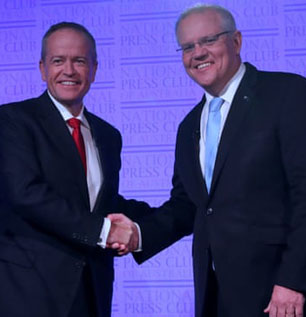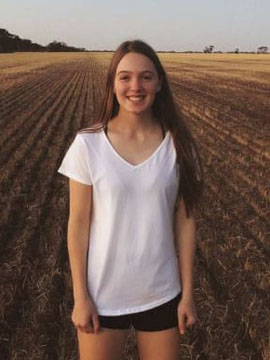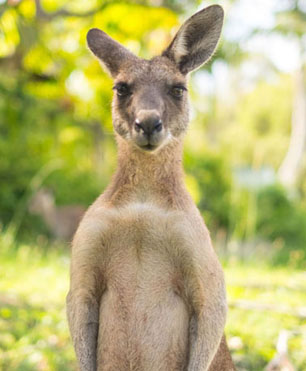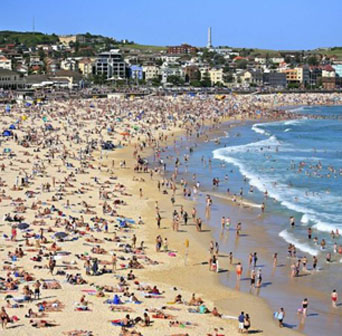Will Labor win in Land of Oz on May 18 (and what will it mean for Liberals in Canada if they don’t) ??
May 15th, 2019 | By Counterweights Editors | Category: Countries of the World[SCROLL DOWN FOR MAY 19/20 UPDATE ON ELECTION RESULTS]. With only a few days until voting on Saturday, May 18, the 2019 Australian federal election seems a closer thing than it appeared to be six months ago.
(Fellow Commonwealth citizens in northern North America should also note that Australia is considerably further ahead of us in time of day than either the UK or France. Polling places down under on May 18 will close at 6 PM. And, eg, 6 PM in Sydney is 4 AM in Toronto. By 10 AM ET this coming Saturday – and only 7 AM PT in Vancouver – we should have at least some serious sense of the election results in the Land of Oz.)
As one of our excellent Twitter correspondents from down under, Meredith King, explained to us a day or so ago : “Polls suggest it’s very close but Labor have hit their stride in the past week. Anything to do with action on climate gains traction every day.”
A similar story is told by Max Walden on aljazeera.com : “Here’s everything you need to know about Australia’s election … The opposition Labor Party is expected to win Saturday’s election, with climate change emerging as a key issue.”

Mr. Walden also gives a tidy summary of the two main forces contesting the election : “the incumbent Liberal Coalition of Prime Minister Scott Morrison is hoping tax cuts and the enduring resilience of Australia’s economy will be enough to keep it in office … But growth is slowing and climate change has emerged as a major issue after the country’s hottest summer on record … The opposition Labor Party under Bill Shorten is betting voters will instead back its promises to improve education and healthcare as well as create a fairer Australia.”
Aljazeera.com, does not do as well on some practical details. It claims : “Australians will choose 150 members of the House of Representatives (the lower house) and some 76 Senate seats (the upper house).” The parallel summary on the Express website from the UK is more exact : “The election will see voters choose members of the 46th Parliament of Australia with all 151 seats in the House of Representatives and 40 out of 76 seats in the Senate up for election.”
The UK Express also offers a somewhat more sobering account of recent opinion polling : “The latest opinion polls place the [Liberal] Coalition ahead with 38.5 percent. They are closely followed by the ALP [Labor] with 35.5 percent … Green, ONP [One Nation Party] and the other category have 10 percent, four percent and 12 percent respectively … When voters were asked to choose between either the LN/P [Coalition] or ALP, Labor won by four percent – with 52 percent of the vote.”
Like Canada, Australia broadly speaking is a parliamentary democracy, on the Westminster model whose original home is on the Thames River in London, England. But there are at least three intriguing major differences between the two former self-governing dominions of the old global empire on which the sun once never dared to set.
First, Australia has an unusually short, three-year term for members of its “lower” House of Representatives. Second, it actually has the kind of “Triple-E” or elected Senate that Alberta used to urge on Canada. And third, participation in Australian federal elections is compulsory : you can be fined if you don’t vote without a very good excuse.
Similarly, Australia doesn’t have anything quite like the unique province of Quebec in Canada or two official languages. In compensation, perhaps, it also has its own unique geography (and kangaroos etc). Beyond all such things, however, the Land of Oz down under does have some provocative similarities with Canada. And they make the results of its May 18, 2019 federal election a possible source of revealing light on our October 21, 2019 Canadian federal election.
If Labor does not win as many still expect this coming Saturday, eg, that could mean the international forces of right-wing conservatism are growing stronger, not weaker. And that could be bad news for the Justin Trudeau Liberals (more like Labor than the Liberals down under) this coming fall, in the true north, strong and free.
We’ll be watching as closely as we can from such a great geographical distance – even in the current age of high communications technology. And we’ll add a short report below when the results are finally known – probably sometime later this coming Saturday our time, on the northwest shore of the Great Lake Ontario. Stay tuned …
UPDATE MAY 19, 2:00 AM ET (TORONTO) : We’ve waited a bit to report back on what PM and Liberal Coalition leader Scott Morrison has greeted with “I have always believed in miracles.” Despite all polling predictions about a tight race with Labor finishing ahead , it turned out to be a tight race with the incumbent Liberal Coalition finishing ahead!

With just over 75% of the vote now counted it remains unclear whether Mr. Morrison has won a majority or minority government. On numbers from the Australian Broadcasting Corporation (ABC), as of 4 in the afternoon May 19, Australian ET, the Liberal Coalition has 73 seats in the House of Representatives, where 76 is a bare majority. Labor has 65, and Others have 6, leaving 7 seats still to be decided. There does seem a good enough chance that the Coalition will have a majority when all the counting is done. [UPDATE MAY 20 : The ABC is now predicting that the Liberal Coalition will finally have 77 seats, just one over a bare majority!]
For the moment the long and short appears to be that the undecided vote was rather high. After all the last-minute decisions the Liberal Coalition did somewhat better than expected and Labor did somewhat worse – especially as it lost votes to the Greens and other smaller parties! Support for the Coalition was especially strong in the state of Queensland and among older voters. According to the Vice site : “The upset is already being compared to Hilary Clinton’s 2016 US presidential loss and Brexit” in the UK.
This is of course not a good precedent for the fate of the Justin Trudeau Liberals in the October 21 Canadian federal election this fall. (They are more like Labor than the Australian Liberals.) One big lesson they might be drawing is that in a pinch nowadays in countries like Australia and Canada, voters’ concerns about the economy will finally “trump” concerns about the environment. (And too much of the green vote will go to the Green party in any case!) PM Trudeau may already be exploring this proposition with recent headlines like “Canada, U.S. reach deal to lift steel and aluminum tariffs within 2 days.”




